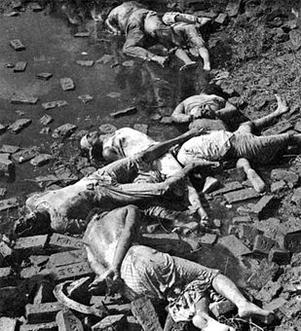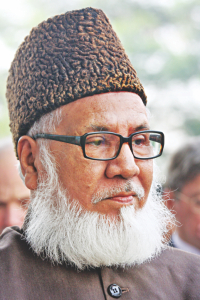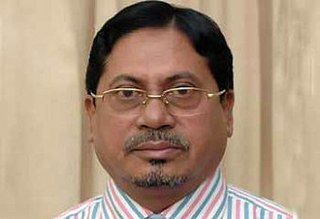
Ghulam Azam was a Bangladeshi politician. He served as the Ameer of the Bangladesh Jamaat-e-Islami.

The Bangladesh genocide was the ethnic cleansing of Bengalis, especially Bengali Hindus, residing in East Pakistan during the Bangladesh Liberation War, perpetrated by the Pakistan Army and the Razakars. It began on 25 March 1971, as Operation Searchlight was launched by West Pakistan to militarily subdue the Bengali population of East Pakistan; the Bengalis comprised the demographic majority and had been calling for independence from the Pakistani state. Seeking to curtail the Bengali self-determination movement, erstwhile Pakistani president Yahya Khan approved a large-scale military deployment, and in the nine-month-long conflict that ensued, Pakistani soldiers and local pro-Pakistan militias killed between 300,000 and 3,000,000 Bengalis and raped between 200,000 and 400,000 Bengali women in a systematic campaign of mass murder and genocidal sexual violence. In their investigation of the genocide, the Geneva-based International Commission of Jurists concluded that Pakistan's campaign involved the attempt to exterminate or forcibly remove a significant portion of the country's Hindu populace. West Pakistanis in particular were shown by the news that the operation was carried out because of the 'rebellion by the East Pakistanis' and many activities at the time were hidden from them, including rape and ethnic cleansing of East Pakistanis by the Pakistani military.

Motiur Rahman Nizami was a politician, former Minister of Bangladesh, Islamic scholar, writer and a former Ameer of the Bangladesh Jamaat-e-Islami. He is noted for leading Al-Badr during the Bangladesh Liberation War. On 29 October 2014, he was convicted of masterminding the Demra massacre by the International Crimes Tribunal of Bangladesh. Nizami was the Member of Parliament for the Pabna-1 constituency from 1991 to 1996 and again from 2001 to 2006. He also served as the Bangladeshi Minister of Agriculture and Minister of Industry.
The Razakar was an East Pakistani paramilitary force organised by General Tikka Khan in East Pakistan.

Ali Ahsan Mohammad Mojaheed was a Bangladeshi politician who served as a Member of Parliament and as the Minister of Social Welfare from 2001 to 2007. He was executed in 2015 for war crimes committed during the 1971 Liberation war of Bangladesh.

Muhammad Kamaruzzaman was a Bangladeshi politician and journalist who served as the senior assistant secretary general of Bangladesh Jamaat-e-Islami and was convicted of war crimes during the 1971 independence war of Bangladesh. He was executed by hanging at Dhaka Central Jail at 22:01 on 11 April 2015.

Bangladesh Jamaat-e-Islami, previously known as Jamaat-e-Islami Bangladesh, is a Bangladeshi Islamist political party; it is the largest Islamist political party in Bangladesh.
Chowdhury Mueen-Uddin, is a British citizen convicted of war crimes committed during the Bangladesh War of Independence which involved the killing of intellectuals in collaboration with the Pakistan Army. After the liberation of Bangladesh, Chowdhury escaped from Bangladesh and attained British citizenship. Bangladesh has yet to file a request with the UK government to bring back Mueen, and the two countries do not have any extradition treaty signed between them.

The International Crimes Tribunal (Bangladesh) (ICT of Bangladesh) is a domestic war crimes tribunal in Bangladesh set up in 2009 to investigate and prosecute suspects for the genocide committed in 1971 by the Pakistan Army and their local collaborators Razakars, Al-Badr and Al-Shams during the Bangladesh Liberation War. During the 2008 general election, the Awami League (AL) pledged to try war criminals. The government set up the tribunal after the Awami League won the general election in December 2008 with a more than two-thirds majority in parliament.

The International Crimes Tribunal (ICT) is an ongoing tribunal in Bangladesh that aims to investigate and administer justice regarding the war crimes, crimes against humanity, genocide and crimes against peace committed by Pakistan army and their local collaborators Razakar, Al-Badr, Al-Shams during the Bangladesh Liberation War of 1971. In 2008's public election, one of the principal electoral manifestos of the Awami League was to initiate the trial process of war criminals. As promised, a member of parliament from Awami League submitted the proposal of the trial of war criminals on 29 January 2009 in National Parliament and the proposal was accepted unanimously. Finally after 39 years of Liberation of Bangladesh, on 25 March, the tribunal, attorney panel and investigation organization was formed for the trial of the ones accused of war crimes.
Steven Walton Kay, KC is a British international criminal lawyer.
Abdur Razzaq is a Bangladeshi barrister and former Assistant Secretary General of political party Bangladesh Jamaat-e-Islami. He was the chief defence counsel at Bangladesh's International Crimes Tribunal until the end of 2013, when he left Dhaka for London. There he practices at the English Bar.

Abdul Quader Mollah was a Bangladeshi Islamist leader, writer, and politician of the Bangladesh Jamaat-e-Islami, who was convicted of war crimes and sentenced to death by the International Crimes Tribunal, Bangladesh (ICT) set up by the government of Bangladesh and hanged. The United Nations raised objections to the trial's fairness, while the general public in Bangladesh widely supported the execution.

On 5 February 2013, protests ignited in Shahbagh, Bangladesh, fueled by the call for the execution of the convicted war criminal Abdul Quader Mollah. Previously sentenced to life imprisonment, Mollah was convicted on five of six counts of war crimes by the International Crimes Tribunal of Bangladesh. Mollah supported the West Pakistan during the 1971 Bangladesh Liberation War and played a crucial role in the murder of numerous Bengali nationalists and intellectuals. The demonstrations also sought the government's ban on the radical right-wing and conservative-Islamist group, Jamaat-e-Islami from participating in politics, including elections, and a boycott of institutions supporting or affiliated with the group.

On 28 February 2013, the International Crimes Tribunal sentenced Delwar Hossain Sayeedi, the vice-president of the Jamaat-e-Islami to death for war crimes committed during the 1971 Bangladesh Liberation War. Following the sentence, activists of Jamaat-e-Islami and its student wing Islami Chhatra Shibir attacked Hindus in different parts of the country. Hindu properties were looted, Hindu houses were burnt into ashes and Hindu temples were desecrated and set on fire. While the government has held the Jamaat-e-Islami responsible for the attacks on minorities, the Jamaat-e-Islami leadership has denied any involvement. Minority leaders have protested the attacks and appealed for justice. The Supreme Court of Bangladesh has directed law enforcement to start suo motu investigation into the attacks. The US Ambassador to Bangladesh expressed concern about attacks by Jamaat on the Bengali Hindu community.
2013 Bangladesh violence refers to the political instability, increase in crime and widespread attacks of minorities and opposition activists.
2013 (MMXIII) was a common year starting on Tuesday of the Gregorian calendar, the 2013th year of the Common Era (CE) and Anno Domini (AD) designations, the 13th year of the 3rd millennium and the 21st century, and the 4th year of the 2010s decade.

The movement demanding trial of war criminals is a protest movement in Bangladesh, from 1972 to present demanding trial of the perpetrators of 1971 Bangladesh genocide during the Bangladesh Liberation War from Pakistan.

Mir Quasem Ali was a Bangladeshi philanthropist and a politician of the Jamaat-e-Islami party. He was a former director of Islami Bank and chairman of the Diganta Media Corporation, which owns Diganta TV. He founded the Ibn Sina Trust and was a key figure in the establishment of the NGO Rabita al-Alam al-Islami. He was sentenced to death on 2 November 2014 for crimes against humanity committed during the Liberation War of Bangladesh in 1971 by International Crimes Tribunal of Bangladesh.











